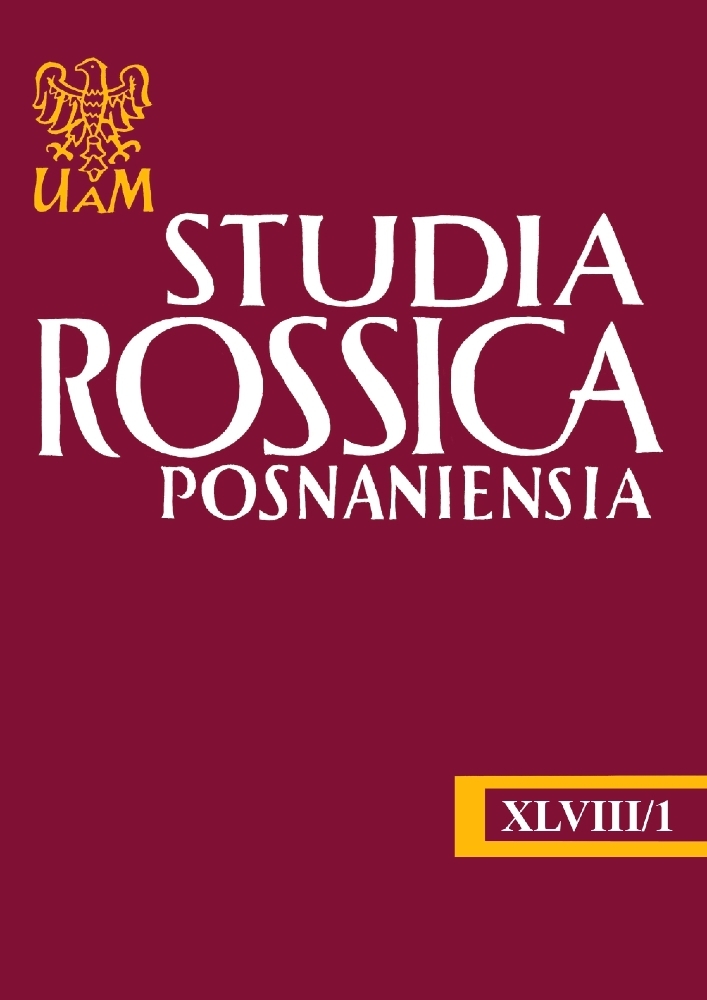Abstract
The paper deals with the role of context and its features in the interpretation of ironically used metalinguistic (reflexive) expressions in the Russian, Polish, and English languages. Although contextual cues have always been a major topic of interest to irony scholars, more research seems to be needed on how context interacts with a metalinguistic expression and how it indicates that such an expression is to be interpreted ironically. It is clear that the most natural context in the situation in question is speech (in a broad sense) that is referred to in particular metalinguistic expressions. Therefore, the main goal of the paper is to establish the crucial features of linguistic units that could be named and described by metalinguistic expressions and to specify relations between the former and the latter. The main criteria used to classify the examples that are analyzed in the paper are 1) the type of the linguistic unit in the context, 2) the type of contradiction between the metalinguistic expression and the context, and 3) the limits of the context that is required for ironical interpretation of the metalinguistic expression.
References
Bahtin, Mihail. Problemy poètiki Dostoevskogo. Moskva, Russkie slovari – Âzyki slavânskoj kulʹtury, 2002.
Barbe, Katharina. Irony in Context. Amsterdam, Benjamins, 1995. DOI: https://doi.org/10.1075/pbns.34
Colston, Herbert L. „Irony Performance and Perception: What Underlies Verbal, Situational and Other Ironies?”. Irony in Language Use and Communication. Red. Angeliki Athanasiadou, Herbert L. Colston. Amsterdam, John Benjamins, 2017, s. 19–42. DOI: https://doi.org/10.1075/ftl.1.02col
Danielewiczowa, Magdalena. „Terminomania i terminofobia we współczesnej lingwistyce”. Staropolskie Spotkania Językoznawcze 3: Terminy w językoznawstwie synchronicznym i diachronicznym. Red. Tomasz Mika, Dorota Rojszczak-Robińska, Olga Ziółkowska. Poznań, Wydawnictwo Rys, 2018, s. 11–29.
Ermakova, Olga. Ironiâ i ee rolʹ v žizni âzyka. Kaluga, Izdatelʹstvo KGPU im. K.È. Ciolkovskogo, 2005.
Evgenʹeva, Anastasiâ, red. Slovarʹ russkogo âzyka: w 4-ch t. Moskva, Poligrafresursy, 1999.
Garmendia, Joana. Irony. Cambridge, Cambridge University Press, 2018. DOI: https://doi.org/10.1017/9781316136218
Grice, Paul. „Logika a konwersacja”. Język w świetle nauki. Red. Barbara Stanosz. Warszawa, Czytelnik, 1980, s. 91–114.
Kiklewicz, Aleksander. „Pragmatyka bez semantyki”. Język poza granicami języka 2. Semantyka a pragmatyka: spór o pierwszeństwo. T. 1: Aspekty lingwistyczno-semiotyczne. Red. Aleksander Kiklewicz. Olsztyn, Centrum Badań Europy Wschodniej, 2011, s. 25–70.
Kreuz, Roger J. Irony and Sarcasm. Cambridge, MA, The MIT Press, 2019. DOI: https://doi.org/10.7551/mitpress/12503.001.0001
Lucy, John A. „Reflexive Language and the Human Disciplines”. Reflexive language: Reported speech and metapragmatics. Red. John A. Lucy. Cambridge, Cambridge University Press, 1993, s. 9–32. DOI: https://doi.org/10.1017/CBO9780511621031.003
The Merriam-Webster Dictionary. Springfield, MA, 2004.
Mokienko, Valerij, Tatʹâna Nikitina, red. Tolkovyj slovarʹ âzyka Sovdepii. Sankt-Peterburg, Sankt-Peterburgskij gosudarstvennyj universitet, 1998.
Starodvorskaia, Ekaterina. „Ku wstępnej typologii ironicznych wyrazów metajęzykowych (na podstawie języka rosyjskiego i polskiego)”. Studia Wschodniosłowiańskie, 21, 2021, s. 213–223. DOI: https://doi.org/10.15290/sw.2021.21.14
Uniwersalny słownik języka polskiego. Warszawa, Wydawnictwo Naukowe PWN, 2004.
Wilson, Deidre. „Irony Comprehension: A Developmental Perspective”. Journal of Pragmatics, 59, 2013, s. 40–56. DOI: https://doi.org/10.1016/j.pragma.2012.09.016
Wilson, Deidre, Dan Sperber. „On Verbal Irony”. Lingua, 87, 1992, s. 53–76. DOI: https://doi.org/10.1016/0024-3841(92)90025-E
License
Copyright (c) 2023 Ekaterina Starodvorskaia

This work is licensed under a Creative Commons Attribution-NonCommercial-ShareAlike 4.0 International License.

